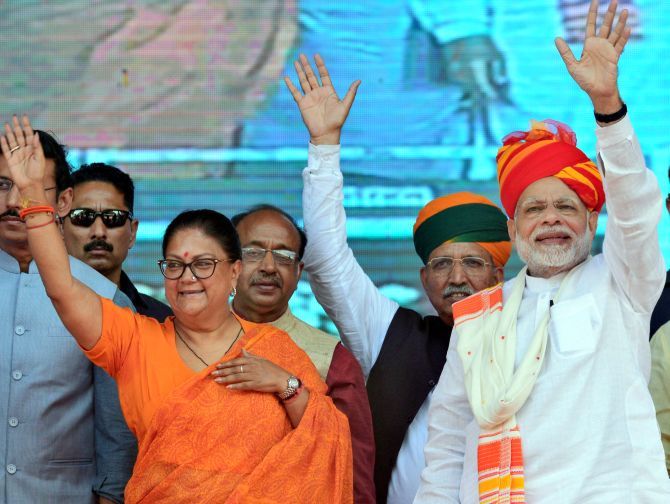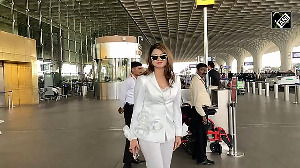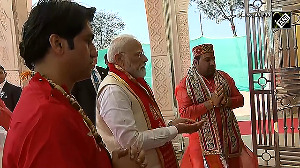BJP banks on Modi, Congress on its candidate Manvendra Singh in Barmer, India's largest constituency by area after Ladakh.
Arup Roychoudhury reports.

Outside the Barmer railway station, there are two huge hoardings.
One features the Congress's Manvendra Singh with various local party leaders -- none of the Gandhi family scions are there.
Right next to it features one one person -- Prime Minister Narendra Damodardas Modi with the slogan 'Modi hain toh mumkin hain'.
Another smaller hoarding a few metres down the road does feature the face of BJP's Barmer candidate Kailash Chaudhary, dwarfed by a larger picture of Modi.
Barmer is India's largest constituency by area after Ladakh.
Home to important military installations like the Jaisalmer air force station, the Uttarlai air force station, and the Pokhran test range, Barmer has the longest continuous border with Pakistan among all constituencies.
Among the older generation, caste loyalties run deep in this vast dry, desert region.
According to regional Congress and BJP workers, the breakdown of the main voting blocks are as follows: There are about 350,000 votes each from the Jat, Muslim and scheduled caste communities, around 500,000 other backward classes voters, approximately 250,000 Rajput voters, and around 70,000 scheduled tribe voters.

In the 2014 general election, Barmer recorded the second highest turnout in Rajasthan, with nearly 73 per cent of the 1.68 million eligible voters casting their vote.
The incumbent BJP candidate Colonel Sona Ram, who has previously represented the constituency in the Lok Sabha for Congress as well, hasn't been considered this time.
Kailash Chaudhary is said to have support of his community, the Jats.
"I will vote for the BJP and Kailash Chaudhary. Caste matters here. Had the Congress fielded a Jat candidate, I would have considered. But then, too, Modi has achieved more than past prime ministers," says Dilip Chaudhary, a 24-year-old wedding DJ in Barmer city.
Kailash Chaudhary, currently a member of the Rajasthan assembly, rose through the ranks of the BJP from grassroots and is said to be approachable and affable.
His own people, however, admit he is a relative lightweight.
"On our own, we will find it difficult to compete with legacy and the grassroots network of the Jaswant Singh and his son Manvendra," says a BJP campaign manager who handles Barmer and three other constituencies.
"However, we have Modi. His popularity is un-paralleled and our messaging is focused around his achievements and the issue of nationalism." The campaign manager agreed to speak on condition of anonymity.
Indeed, at a rally in Samdari village near the textile town of Balotra, various BJP and BJYM (Bharatiya Janata Yuva Morcha) leaders were sticking to the script.
They talked about the rural roads and electrification programmes, the LPG scheme for rural women, and about how Modi taught Pakistan a lesson.
"Every vote for Modi will be equal to a bullet against terrorism," Chaudhary said on the dais.
He was constantly being mobbed by younger BJP supporters for selfies.

The only leader who did not directly attack the Gandhi family and did not resort to nationalism was star speaker Vasundhara Raje, the former chief minister of the state.
The crowd of about 1,200 villagers did not respond to slogans regarding the Modi government's achievements as much as they responded to chants of 'Bharat Mata ki Jai'.
In fact when one of the local BJP leaders spoke about the LPG scheme, a quick survey of the women in the crowd revealed that most of them hadn't got their gas connections.
This was markedly different from Manvendra Singh's rallies and interactions.
At the courtyard of his rented bungalow on the outskirts of Barmer, a crowd of around 50 people had gathered with various requests, waiting for Singh to listen to them.
His interactions throughout the time that I spent with him were much smaller, more on the lines of sabha meetings.
"A Lok Sabha election is a mix of local and national factors. The combination between the two is what the clincher is. I am keeping it as local as I can. For me, it is a matter of personal contract built over the years, a personal network, the friendship built over the years," Singh says on the way to another campaign stop.
Not once does he say 'Bharat Mata ki Jai', instead it is the shorter 'Jai Hind'.
Singh is said to have the support of most Rajputs and Muslims.
His votebank is loyal to his family and not to any party.
Mohammad Haroon, a 53-year old vegetable wholeseller, said he voted for BJP earlier when Singh was its member.
Now, he will vote for Congress. "The BJP openly threatens our community. Why should we vote for them? Hum party nahi, insaan dekhte hain."












 © 2025
© 2025